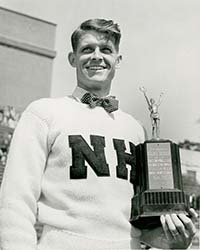 |
 |
| current issue |  | past issues |  | send a letter/news |  | address update |  | advertise |  | about us |  | alumni home |
In Memoriam
|
A. Richmond Morcom '47
He applied Olympian intensity to everything he did. By Karen Tongue Hammond '64 |
|
 When A. Richmond "Boo" Morcom '47 ventured outside, neighborhood children knew good things were going to happen. It almost always involved track, says his daughter Bonney Teti. He organized street races and long-jump events, recorded distances and times and critiqued performances. He took the street competitions seriously, but "the kids loved it," she recalls.
When A. Richmond "Boo" Morcom '47 ventured outside, neighborhood children knew good things were going to happen. It almost always involved track, says his daughter Bonney Teti. He organized street races and long-jump events, recorded distances and times and critiqued performances. He took the street competitions seriously, but "the kids loved it," she recalls.
Morcom, who died on Oct. 3 at age 91 of age-related ailments, entered UNH in 1940 having already set a number of track records at Braintree High School in Massachusetts. Although World War II interrupted his education after his junior year—he was an officer and paratrooper in the 11th Airborne Division, serving in the Pacific Theater—he returned to UNH, majored in biology and set collegiate records as a pole vaulter, high jumper and long jumper. His long-jump record stood for 67 years. In the press he was known as "One Shoe Boo" for his penchant for high jumping with one shoe on and one shoe off. He met his wife, Betty, at UNH; they were married for 19 years, and had three children.
By 1948, Morcom was the national champion in the pole vault and had qualified for the Olympics. But the games, which his son, David, says he viewed as "one of the greatest achievements of his life," also brought disappointment. Although he managed a respectable sixth-place finish despite a sprained ankle, his competitive spirit wasn't satisfied. After the games, he challenged the five vaulters who had bested him to a rematch in their own countries. He beat them all—and the Olympic winning height by 6 inches.
Although he was fiercely competitive, Morcom kept sports in perspective, says David, and had a great sense of humor, including telling stories on himself. After trouncing one of the Olympic medalists on his home turf, he was honored by the athlete's family with a reception. A feisty grandmother, says David, "took my father aside, pulled her grandson's Olympic medal out of a chest, and said, 'You may have beaten my grandson today, but you'll never have one of these.'" In 1956, Morcom returned to the Olympics—this time as coach of the U.S. women's track and field team at the Melbourne, Australia, games.
From 1948-1950, Morcom was the assistant track and field coach at the University of Pennyslvania before being recalled to serve in Korea as a jumpmaster in the 101st Airborne Division "Screaming Eagles." When his service ended, he returned to Penn and spent 35 years coaching there. Bob Glascott, who worked with Morcom, remembers his popularity with students. "He gave them his home phone number, and if he happened to miss an athletic event for some reason, they would call to find out where he was."
At age 69, when he heard a rumor that he was past his prime, Morcom told a Philadelphia Inquirer sports writer that it had the effect of "high-octane gas in my veins." A week later, he broke the world long-jump record for his age group. Morcom was elected into seven halls of fame, including UNH's.
Although he competed in international master's competitions until he was 80, it was far from his only interest. He also wrote magazine articles, painted, took photographs, traveled to 105 different countries and often hiked up Mount Washington with David, where the two of them would spend the night. A voracious reader, Morcom became fascinated by the story of Lucy Hale, a New Hampshire senator's daughter thought to be secretly engaged to Lincoln assassin John Wilkes Booth. "When we were kids, he talked about Lucy Hale so much that for a long time my sisters and I assumed she was a relative," says David. In his 40s, Morcom suddenly became enthralled with antique glass bottles, says Teti. "It seemed like the next day the house was full of glass." He was a "110 percent" type of man, explains his daughter Carol Morcom.
One time when David asked him where he got the energy to charge headlong into so many interests, Morcom's cheerful answer may have summed up his philosophy of life. "If it's worth doing," he replied, "it's worth overdoing."
Return to In Memoriam
blog comments powered by Disqus
